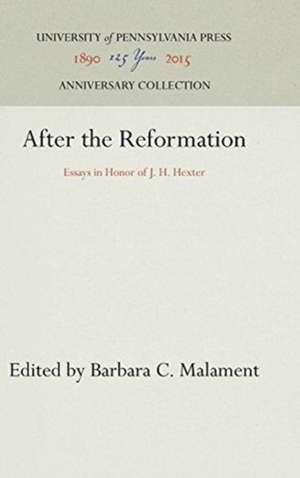After the Reformation – Essays in Honor of J. H. Hexter
Autor Barbara C. Malamenten Limba Engleză Hardback – 28 aug 1980
Born in Memphis, Tennessee, J. H. Hexter received his B.A. degree from the University of Cincinnati and his Ph.D. degree from Harvard University. From 1939 to 1957 he taught at Queens College, CUNY. He then spent seven years as a member of the faculty of Washington University, to which he returned on his retirement from Yale University; where he taught from 1964 to 1978. Among his numerous awards are two Guggenheim Fellowships, a Fulbright Fellowship, a fellowship from the Ford Foundation and one from the Institute for Advanced Study.
Preț: 645.26 lei
Preț vechi: 725.00 lei
-11% Nou
Puncte Express: 968
Preț estimativ în valută:
123.47€ • 128.91$ • 102.19£
123.47€ • 128.91$ • 102.19£
Carte tipărită la comandă
Livrare economică 04-18 aprilie
Preluare comenzi: 021 569.72.76
Specificații
ISBN-13: 9780812277746
ISBN-10: 0812277740
Pagini: 368
Dimensiuni: 152 x 229 x 15 mm
Greutate: 0.7 kg
Ediția:Reprint 2016
Editura: MT – University of Pennsylvania Press
ISBN-10: 0812277740
Pagini: 368
Dimensiuni: 152 x 229 x 15 mm
Greutate: 0.7 kg
Ediția:Reprint 2016
Editura: MT – University of Pennsylvania Press
Notă biografică
Barbara C. Malament was a fellow of the Society for the Humanities at Cornell University.
Descriere
Civilization and madness; community and class; bureaucracy, corruption, and revolution--these essays range from social history to political history and the history of ideas, and all take a strong interpretive stand. Together they make a major contribution to the scholarship on sixteenth-century and seventeenth-century Europe.
